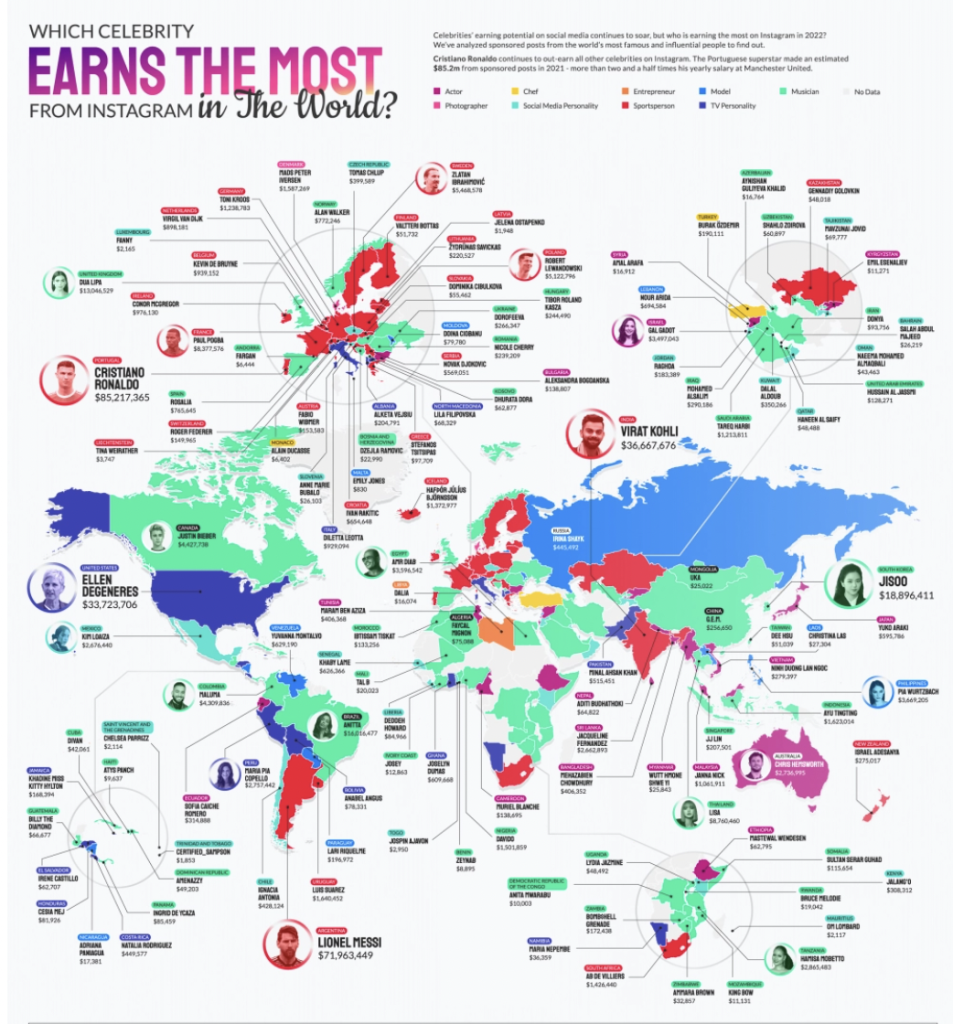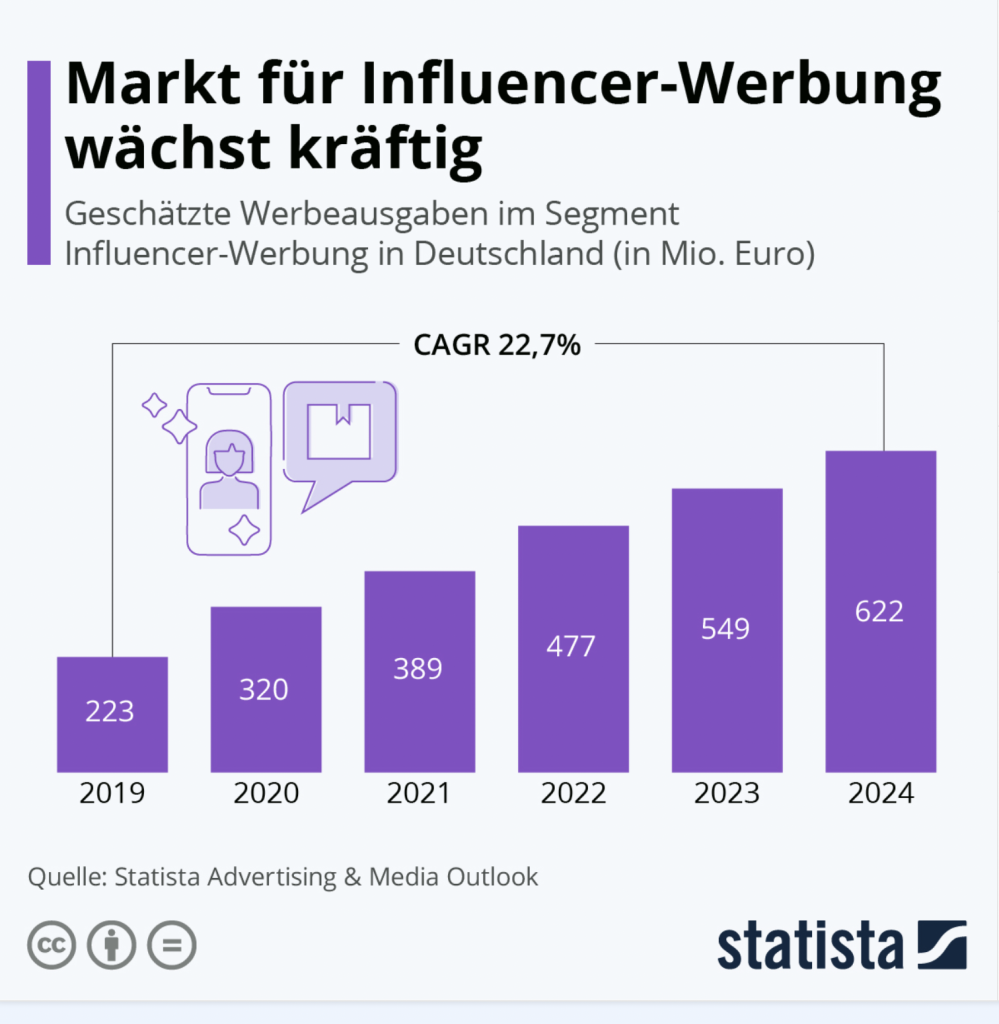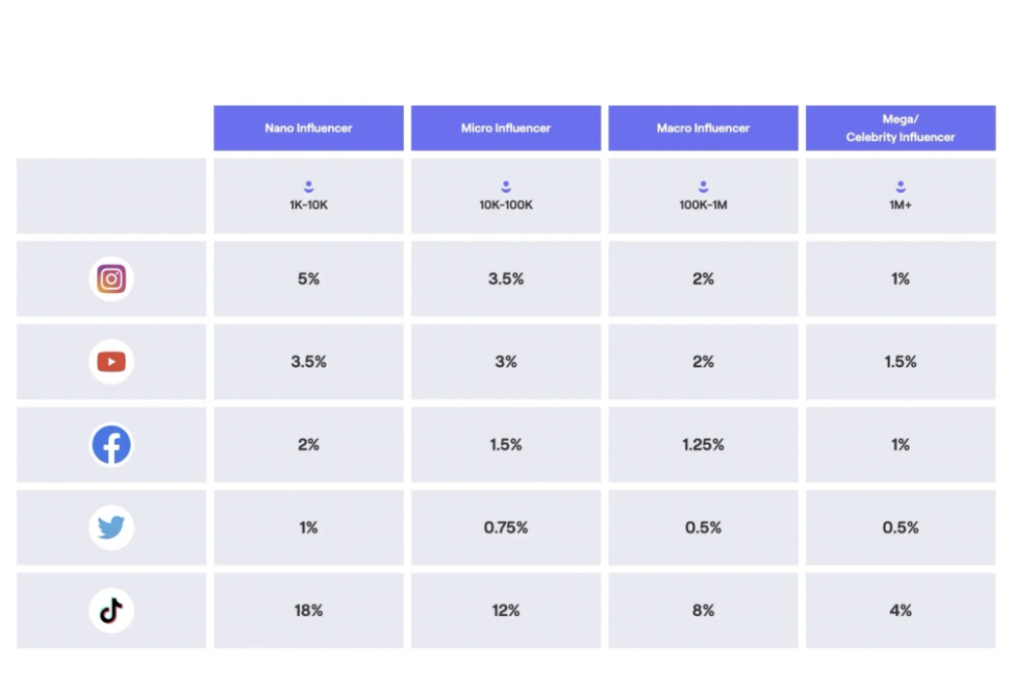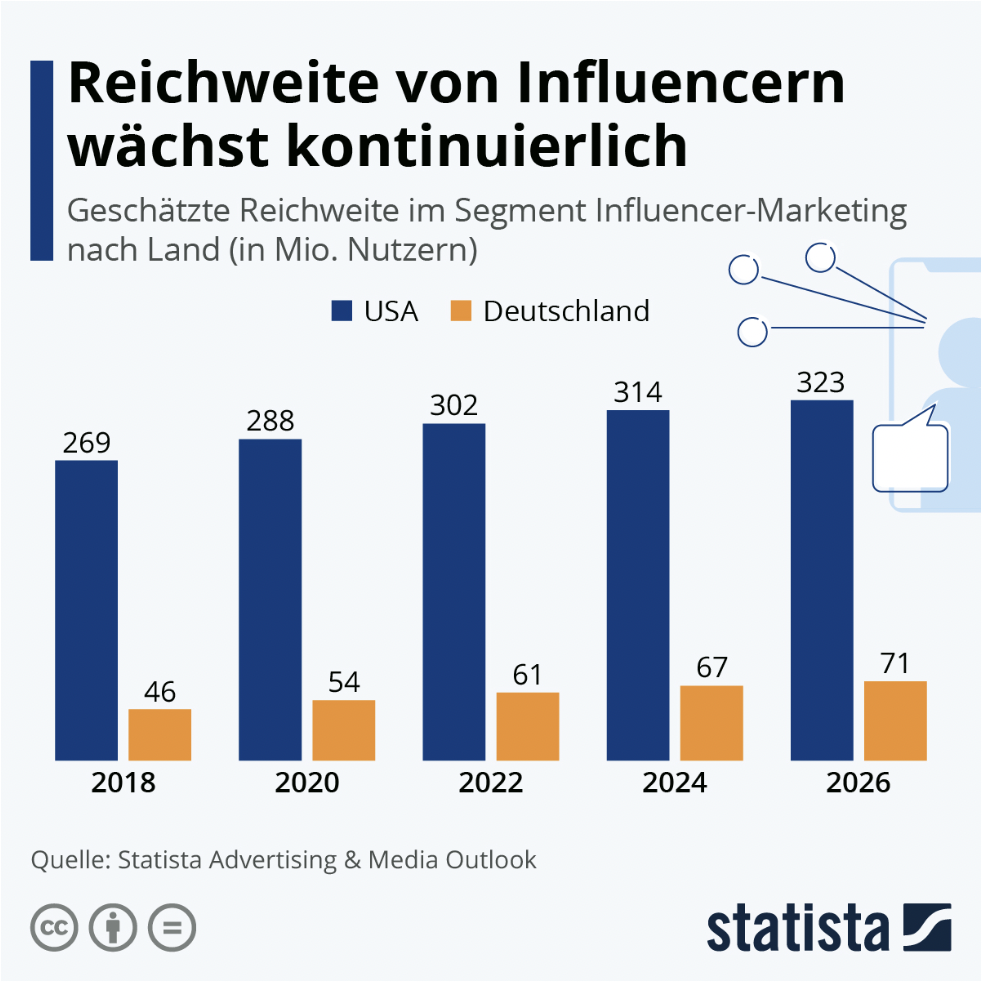Influencer marketing statistics: figures that marketers will need to know in 2024

Imagine if you could increase your brand’s awareness virtually overnight, reach your target audience in a direct and authentic way and secure an impressive return on investment in the process. Sounds almost too good to be true, doesn’t it? But the latest influencer marketing statistics for 2024 prove that this is well within the reach of modern marketing strategies. In an era where traditional advertising formats are losing traction and consumers are craving authentic, trustworthy recommendations, influencer marketing has established itself as a key strategy for gaining visibility in the digital world.
The numbers don’t lie: over 78% of marketers in the US already rely on the power of influencers, and that number is on its way up. But why is influencer marketing so effective? It’s about authenticity, the trust that influencers have built with their community and the ability to convey messages in a way that is not only heard, but also felt.
From Instagram to YouTube to TikTok, influencer marketing statistics show that brands that use these channels wisely can not only increase their reach, but also build a deeper connection with their target audience. As we enter influencer marketing in 2024, we highlight the latest statistics and explain why this strategy is far more than a passing trend – it’s an essential ingredient for your brand’s success in the digital landscape.
How effective is influencer marketing really?
The answer will surprise you. Studies show that for every dollar brands invest in influencer marketing, they get an average of 5.78 dollars back. This not only shows an impressive return on investment, but also the power of authentic recommendations. In fact, 69% of consumers trust influencer recommendations more than traditional forms of advertising. With this strategy, you can not only increase your brand’s visibility, but also build a genuine connection with your target audience and positively influence their purchasing decisions.
Social media platforms: Where influencer marketing dominates
1. TikTok: Center for creativity and virality
TikTok has established itself as a leading platform for creative and viral content that particularly appeals to the younger generation. With an engagement rate of 17.96% for influencers with less than 15,000 followers, TikTok shows that it is not the number of followers that counts, but the quality and creativity of the content. The platform enables brands to become part of the daily conversation with short, catchy videos. 58% of shoppers said they bought a product after seeing it on social media, highlighting the direct influence of influencer recommendations on purchasing decisions. TikTok fosters an environment where authenticity and originality thrive, making it an indispensable tool for brands looking to reach a younger audience.
2. Instagram: The visual arena of engagement
Instagram remains the platform par excellence for influencer marketing: more than 78% of marketers in the US plan their marketing strategy with influencers. Known for its visual appeal, the platform has proven to be indispensable for brands looking to promote their products with aesthetically pleasing content. With features such as Stories, which are seen by 500 million users every day, and Reels, Instagram offers a dynamic environment for brands to increase engagement and brand awareness. Cristiano Ronaldo, who is the top earner on Instagram with revenues of 85.22 million US dollars from sponsored posts, underlines the monetary strength of the platform. In addition, women dominate the field of influencers on Instagram with 77% of content creators generating revenue, underlining the diversity and reach of the platform.

3. YouTube: The platform for depth and credibility
YouTube, with its ability to present long-form content, allows for a deeper and more long-lasting connection between influencers and their audience. The video platform is particularly valuable for in-depth product reviews, tutorials and storytelling, with 70% of teen subscribers saying they feel more connected to YouTube creators than traditional celebrities. This strong bond is particularly relevant as 4 in 10 millennials say their favorite YouTubers understand them better than their friends. Videos from top YouTubers perform better than videos from celebrities, highlighting the effectiveness and engagement of influencers.
Is influencer marketing really worth the hype?
ROI and convincing figures
The return on investment (ROI) of influencer marketing has proven to be exceptionally strong, with average returns that dispel any investment skepticism. Companies receive an average of $6.50 for every dollar they invest in influencer marketing, with some even getting back up to $20 or more. This impressive return on investment shows that influencer marketing is not only an effective, but also an efficient strategy to achieve marketing goals.

50.7% of brands work with influencers
You can see from the large numbers that the importance of influencer marketing in digital commerce is essential. The ability to communicate with potential customers in a targeted and authentic way through trusted influencers has proven to be an invaluable asset in increasing product visibility and driving direct sales.
At 2.53%, nano-influencers had the highest engagement rate
Nano-influencers = influencers with 1,000 to 5,000 followers. This figure is particularly revealing as it highlights the importance of quality of interaction over quantity of followers. The high engagement rate of nano-influencers suggests that brands working with them can reach an engaged and responsive audience, increasing the likelihood of conversions.
51% of marketers are convinced of influencer marketing
The effectiveness of influencer marketing is also reflected in customer acquisition: 51% of marketers report that they were able to acquire better customers through influencer marketing. These customers are often more engaged and loyal, which can be attributed to the authentic recommendation of a trusted influencer. Furthermore, 36% of marketers believe that influencer-generated content performs better than brand-created posts. This belief highlights the ability of influencers to deliver messages in a way that resonates and drives genuine engagement.
Influencer marketing achieves 11 times higher ROI than traditional banner advertising
This figure is a clear testament to the superior effectiveness of influencer marketing in today’s digital marketing landscape.
The role of micro-influencers: quality over quantity
Have you noticed that the influencers with the most followers don’t always have the biggest impact? This is where micro-influencers come in – those with 1,000 to 100,000 followers can be a goldmine for brands looking for authentic audience engagement and a high engagement rate. They are characterized by a close relationship with their community, which is reflected in an average engagement rate of an impressive 2.53%. In comparison, larger influencers often have lower engagement rates, which supports the theory that as the number of followers increases, the interaction rate tends to decrease. The high engagement rate is a clear indication that micro-influencers are able to engage with their followers on a deeper and more personal level.

Another advantage of micro-influencers is their credibility and authenticity. As they usually cover specific niches, their recommendations are considered particularly trustworthy. Studies show that 69% of consumers trust the recommendations of influencers, which underlines the importance of authentic and credible voices in the marketing mix. In addition, studies have shown that brands that work with micro-influencers not only benefit from higher engagement rates, but can also achieve a more targeted approach to their desired target group. This leads to higher quality leads and stronger customer loyalty, as followers of micro-influencers perceive their recommendations as personal tips rather than paid advertising.
The combination of high engagement, authenticity and the ability to target niche markets makes micro-influencers an invaluable asset for brands looking to build a genuine connection with their target audience.
Global influencer marketing trends and statistics
Global statistics tell us a fascinating story about the worldwide importance and influence of influencer marketing. Let’s start with a look at the global market: influencer marketing has developed into an impressive industry, estimated to be worth 21.1 billion US dollars in 2023. This figure illustrates the enormous growth of an industry that was considered a niche market just a few years ago. The global reach and acceptance of influencer marketing shows that brands worldwide have recognized the power of authentic voices and personal recommendations.
- Interestingly, Khaby Lame is the undisputed leader on TikTok with an impressive 231.4 million followers. Known for his comedy videos, his involvement in the world of cryptocurrencies and his advertising partnerships with the likes of PSG soccer club and fashion brand Hugo Boss, Lame has demonstrated a new dimension of success as an influencer. According to Forbes, his earnings are around ten million US dollars, highlighting the financial possibilities of influencer marketing for individuals and highlighting TikTok as a lucrative platform for global influencers.
- Another notable trend is the dominance of female influencers on the global market. 77 percent of content creators making money worldwide are female. This imbalance not only shows the strength and influence of women in the influencer marketing industry, but also the diversity of the content and niches they cover.
- In the UK, for example, Google searches for “influencer marketing” increased by 400% between 2016 and 2023. This statistic demonstrates the growing interest and importance of influencer marketing in certain markets and underlines the need for brands to keep abreast of the latest trends and developments in this area.
- In the USA, an impressive USD 26.09 billion was invested in influencer marketing in 2023, underlining the strategic importance of this form of marketing for American companies. These investments show how seriously brands take connecting with their target audiences through influencers and how willing they are to invest in these relationships.
Influencer marketing in Germany – 8 surprising statistics
- How many influencers are there in Germany?
A fascinating study by Influencity reveals that 0.7% of the German population, or 587,744 people, are active as influencers. This means that 2.35% of all German Instagram users fall into the influencer category, making Germany the country with the fifth highest influencer density in Europe.
- The reach of influencers in Germany
The reach of German influencers is impressive and growing steadily. From 46 million users reached in 2018 to 61 million in 2022. According to forecasts by Statista, influencers from Germany will reach an incredible 71 million people by 2026.

- Acceptance of influencer marketing by German brands
59% of German brands have recognized the effectiveness of influencer marketing. They are already using this strategy to strengthen their brand presence and attract new customers. This figure is expected to rise further as more and more consumers follow influencers on social media and trust their recommendations.
- Influence on purchasing decisions
A study by Statista shows that almost a quarter of German social media users say they have been inspired to make a purchase by influencers in the last 12 months. Of those surveyed, 24% were influenced by YouTube influencers, while 19% said they had been inspired to make a purchase by Instagram influencers.
- Growing market share of influencer marketing
From 2019 to 2024, the market for influencer marketing in Germany will grow by an average of 22.7% per year. The advertising budget for influencers has risen from 223 million euros in 2019 to 477 million euros per year. It is expected to reach 622 million euros in 2024.
- Generation Z and Influencer Marketing
Almost a third of Generation Z in Germany are already influencers or aspire to become one. This shows that influencer marketing is not only a career option for young people, but also a sign of the growing importance of social media as a source of income.
- Age distribution of followers
81% of 16- to 29-year-old German social media users follow influencers. Even among the over 65s, the figure is still 21%.
- The cost of influencer marketing
A sponsored post from German micro-influencers costs between €10 and €60 on average, while mega-influencers with over 1 million followers can charge €15,000 or more per post.
Conclusion: Does influencer marketing have a future?
After navigating our way through the impressive facts and figures on influencer marketing in 2024 in Germany and worldwide, one question arises. Does influencer marketing have a future? The answer is a resounding yes. The statistics speak for themselves. Influencer marketing is not a passing trend, but a sustainable and growing force in the digital marketing landscape.
In Germany, the impressive number of 587,744 influencers reaching 61 million users highlights the firm position of this marketing strategy. Influencers are projected to reach 71 million people by 2026, emphasizing the ongoing growth and increasing significance of influencer marketing. With 59% of German brands already adopting influencer marketing and an expected market share increase to over 600 million euros by 2024, influencer marketing has a bright future ahead, and we at Lookfamed are eagerly anticipating what it may look like.










 Sign up
Sign up 